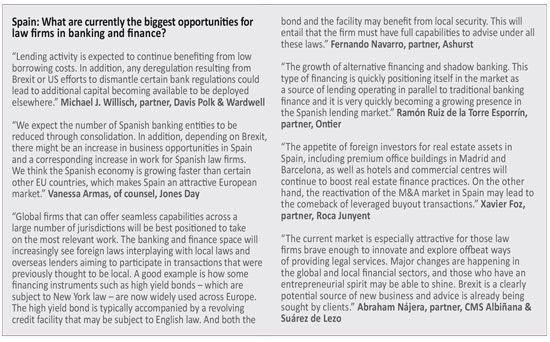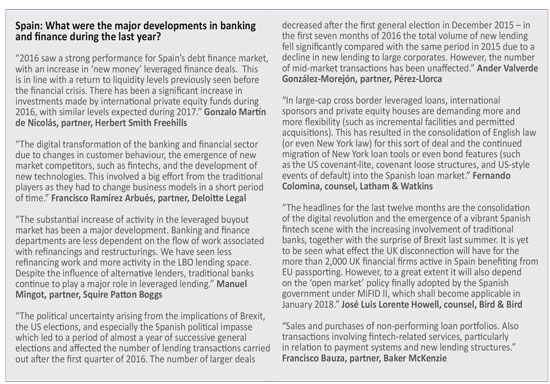 Brexit dealt a blow to banking
and finance lawyers as investors got nervous, and this uncertainty
looks set to continue – however, this problem will be partly
offset by a new wave of foreign investors and direct lenders that
are targeting the Iberian market
Brexit dealt a blow to banking
and finance lawyers as investors got nervous, and this uncertainty
looks set to continue – however, this problem will be partly
offset by a new wave of foreign investors and direct lenders that
are targeting the Iberian market
Banking and finance lawyers claim that, in general, the market
is improving and that there are currently good opportunities for
law firms. However, it's not all been plain sailing. Brexit, in
particular, had the effect of unsettling investors, and a number of
lawyers in Spain report that the flow of deals slowed as
businesses' took time to digest the implications of the
UK's historic referendum. Though investment activity picked up
again in the latter part of 2016, the UK government's recent
invoking of Article 50 – which begins the process of
withdrawing from the European Union – could mean that deals
start stalling once again, lawyers warn. That said, it's not
all doom and gloom – institutional investors are targeting
Spanish assets, while there is also high demand for legal services
from construction companies seeking to refinance debt. In addition,
an array of non-traditional lenders are also currently looking for
business in Spain.
Meanwhile, in Portugal, banks are frantically trying to clear up
their balance sheets – there is a consequently a massive
amount of non-performing loan portfolios, for example, that need to
be shifted and this is an area that is providing rich pickings for
lawyers in Lisbon. Meanwhile, new players are entering the market
as the country's banks pass into foreign ownership. In
addition, shadow banking – specifically, lending by private
equity funds and insurance companies – is on the
increase.
Deal flow was affected by the Brexit vote last year, says Allen
& Overy partner Ignacio Ruiz-Camara. "There was a slowdown
for a couple of months," he adds. Despite this, Ruiz-Camara
says it was a busy year in which a wide range of financing options
came to market, with project bond structures being
"particularly successful". He adds that there were also a
significant number of sales of non-performing loans.
 Volatile market
Volatile market
According to one partner, 2017 has been "somewhat uncertain
and volatile". He adds that, though deals continue to flow,
there is a degree of political uncertainty – the partner, who
works in the Madrid office of a 'Magic Circle' firm,
expresses some doubt that Brexit will "actually happen",
despite the UK's invoking of Article 50, which begins the
formal process of withdrawal from the European Union. He continues:
"For investment bankers in London, it's business as
usual."
One of the most significant developments in the last year has been
banks offering more friendly terms for borrowers says one partner.
"Banking deals now have terms that are more appropriate for
borrowers," she says. Meanwhile, Uría Menéndez
partner Ángel Pérez López says the traditional
banks are now facing significantly more competition "not only
among themselves but also with some direct lenders as well as the
capital markets". Pérez López also says that
Spanish real estate investment trusts, SOCIMIS [Sociedades
Anónimas Cotizadas de Inversión en el Mercado
Inmobiliario], are the most active players in real estate
financing, acquiring commercial real estate such as shopping malls,
office buildings and hotels. In addition, distressed M&A deals
are also generating significant work for banking lawyers, as are
sales of non-performing loans. In this regard, Pérez
López says the volume of transactions involving secured
non-performing loans now exceeds that involving unsecured
non-performing loans. He adds that 2017 is expected to be a
"very active year for distressed M&A due to new banking
regulations on risk policies and loss allowances, which will be
effective on 1 January 2018 and will foster plenty of divestments
before that date."
There is currently a massive amount of liquidity in the market,
according to Gómez-Acebo & Pombo partner Rafael
Aguilera. He adds that Spanish credit funds have entered the market
in the last year, as well as institutional investors, to finance
Spanish companies. However, Aguilera adds that he is pessimistic
about Brexit: "There was a slowdown of transactions due to
Brexit and my concern is that this slowdown may return following
the UK's invoking of Article 50."
Considerable opportunities for banking lawyers are being generated
in the construction sector as construction companies look to
refinance their debt, lawyers say. Meanwhile, Brexit could mean
that Spanish law is increasingly used when drawing up contracts,
according to Cuatrecasas partner Iñigo de Luisa.
"Because of the Brexit-related uncertainties, we already see
more reliance on Spanish law with regard to finance
documentation," he says. "There could be more
international funds relying on Spanish law, not only for
restructuring situations but also for new facilities."
Pérez López adds that there is "uncertainty as
to the proceedings and timings for the recognition of English court
rulings in Spain after the UK leaves the European Union". 
However, Ruiz-Camara argues that English law will continue to be
used outside the UK, regardless of Brexit. He adds that Brexit will
create a lot of work for lawyers as "it will activate
transactions which would not have happened otherwise and deals will
have to be restructured". In a global context, there is an
understanding that the US government could be set to abolish some
existing banking regulations. Jabier Badiola, partner at Dentons
says that, if this was to happen, it could lead to "financial
business being transferred there [the US]".
Disappointed investors
There have been some "inconsistencies in the interpretation of
the law by different insolvency courts" that have disappointed
investors, according to Ruiz-Camara. However, he adds that there
have been more deals, particularly disposals and securitisations.
How will law firms adapt to the changing market conditions?
Ruiz-Camara says that some firms could adopt the approach of having
smaller teams and being more selective in the deals they take
on.
If work is of a commoditised nature, clients are not willing to pay
significant fees, say lawyers. However, there is a perception that,
if the client believes the law firm is adding value to the deals,
they will pay larger fees. Lawyers also report that some clients
have panels and that some law firms agree to offer some services
for free in order to be given the opportunity to bid for future
work. Freshfields' partner Ana López says that one of
the major developments in recent years is that it is becoming more
difficult to predict exactly how deals will be "structured and
refinanced given the wide range of financial instruments and
flexibility that are available in the market".
Alfredo Barona, partner at DLA Piper, says in general, the market
is improving and there has been an increase in leveraged deals.
However, he adds that global political uncertainty is a concern. In
addition, Barona observes that the market is now much more
challenging for lenders due to the increase in competition and the
difficulty in finding attractive business that requires
financing.
There is an increased interest in direct lending, but there is
considerable competition and limited opportunities for lenders at
present, according to Clifford Chance partner Rodrigo Uría.
He adds: "The new lenders entering the market are here to stay
– it's currently a borrowers market and they are driving
the deals."
EU: Uncertain future
Pérez López says that the sophistication of both
products and players in the Spanish finance market continues to
increase, and there is considerable finance-related M&A,
particularly in relation to assets in the renewable energy sector.
However, he also says that a decrease in restructuring work –
which has been "one of the main work streams for banking
lawyers in recent years" – is a concern, as are
uncertainties surrounding the future of the European Union.
Pérez López adds that competition between banking
clients as well as law firms is fierce and the pressure on fees
continues.
With regard to the activities of the legal arms of the ´Big
Four' auditors in the banking and finance market, Barona says
that, while they are not usually "seen on big deals at
present, they are doing things really well and could potentially be
serious competition to big law firms and they need to be
respected". Meanwhile, one partner says the 'Big Four'
have the contacts that enable them to "penetrate
corporates" as well as significant resources.
De Luisa remarks that there are significant opportunities for
financial transactions in Latin America, particularly Mexico,
Colombia and Peru. He adds: "All Spanish firms are deploying
resources there and in many situations, firms' finance
practices are taking the lead in key infrastructure and energy
projects in these jurisdictions."

Portugal: Banks under stress
The Portuguese banking sector is under stress, according to Servulo
managing partner Paulo Câmara. "There are regulatory
constraints, staff cuts and new owners," he says. "There
is less investment from Angola and more from China." Another
major issue facing banks is non-performing loans and, specifically,
whether there should be a single universal solution to this
problem, or whether solutions should be tailored to meet local
requirements, Câmara adds. He also says that smaller banks
and consumer credit organizations are entering the market. However,
there are fewer initial public offerings (IPOs), partly because
businesses "fear the regulation costs involved when
listing," according to Câmara. Yet there are
considerable opportunities for law firms to advise banks, he adds,
to the extent that his firm is hiring more people to meet
demand.
A lot of banking lawyers' work is devoted to clearing banks
balance sheets – particularly selling off non-performing
loans – says Uría Menéndez partner Pedro
Ferreira Malaquias. He adds that private equity funds have a
growing role in the Portuguese banking sector. Meanwhile, Ferreira
Malaquias says lawyers also dedicate "many hours" to
banking regulation work, in particular matters concerning how the
Portuguese government will interpret EU banking regulations. He
adds that there are around €40 billion worth of non-performing
loans that are up for sale in Portugal and some private equity
funds are keen to buy them.
 Foreign banks are becoming
more active in Portugal due to Portuguese banks' lack of
availability with regard to lending, says Filipe Lowndes Marques,
partner at MLGTS. He adds that the uncertainty in the Portuguese
banking system is highlighted by Novo Banco being up for sale,
Millenium BCP being subject to state intervention and therefore
having its "hands tied", as well as shareholder disputes
at Banco BPI. Lowndes Marques also says that there are now more
non-traditional lenders – such as Caixa Credito Agricola
– appearing in syndicated financing deals, though they are
"still feeling their way in the market".
Foreign banks are becoming
more active in Portugal due to Portuguese banks' lack of
availability with regard to lending, says Filipe Lowndes Marques,
partner at MLGTS. He adds that the uncertainty in the Portuguese
banking system is highlighted by Novo Banco being up for sale,
Millenium BCP being subject to state intervention and therefore
having its "hands tied", as well as shareholder disputes
at Banco BPI. Lowndes Marques also says that there are now more
non-traditional lenders – such as Caixa Credito Agricola
– appearing in syndicated financing deals, though they are
"still feeling their way in the market".
Shadow banking
Shadow banking is another growing trend in the Portuguese market,
according to Lowndes Marques. He adds: "Private equity funds
and insurance companies want to lend [in Portugal] –
technically only banks and credit institutions are authorised, but
I don't think entities licensed elsewhere can be stopped from
lending in Portugal – for example, if a credit fund is set up
in Luxembourg or France, can regulations in Portugal stop them
lending here?"
There is, in general, a greater emphasis on the management of
balance sheets in the banking sector, says Linklaters counsel
Gonçalo Veiga de Macedo. "There is a focus on the sale
of non-core assets – banks are currently selling loan
portfolios and residential mortgages," he continues. However,
Veiga de Macedo says there is now a "spotlight on Portugal as
a new destination for investment – real estate assets have
more value".
Achieving a "certain, large, scale" is an increasingly
important objective for banks, Câmara argues. "It is
difficult for a bank to deal with regulatory constraints if it is
small," he adds. "Banks now need to have a certain scale,
otherwise they face difficulties, as we now see with smaller
banks."
PLMJ partner Hugo Rosa Ferreira says the "continuing
recovery" of Portuguese banks is creating plenty of
opportunities for law firms "be it in recapitalization or
quasi-capital raising transactions". He adds: "Also, the
consolidation of the market looks to continue – some smaller
banks continue to look for exit strategies and this is something
that always brings a lot of work to law firms. With regard to
Lusophone Africa, Veiga de Macedo says that there is
"significant project investment" in Angola and Mozambique
that is generating plenty of opportunities for lawyers.
 Meanwhile, the increasing use
of digital banking is also creating considerable regulatory work
for law firms, lawyers say. Law firms´ banking practices used
to be largely transaction-based, but now there is an increasing
need for them to be more proficient in the regulatory aspects of
banking. "Banks need considerable outside support [with regard
to regulation] and this is an opportunity for law firms," one
partner says.
Meanwhile, the increasing use
of digital banking is also creating considerable regulatory work
for law firms, lawyers say. Law firms´ banking practices used
to be largely transaction-based, but now there is an increasing
need for them to be more proficient in the regulatory aspects of
banking. "Banks need considerable outside support [with regard
to regulation] and this is an opportunity for law firms," one
partner says.
Banking with Google?
With regard to the issue of fees, Veiga de Macedo says some clients
that "recurrently work with international firms will
prioritise quality rather than cost when selecting their
lawyers". Lawyers also say that clients are less loyal to
their legal advisers – one partner remarks that
"substantial shareholder changes in banks mean there is often
a reset in the client-lawyer relationship".
Banks cannot ignore the rise of the fintech sector, lawyers say;
they also anticipate that companies like Google will have an
ever-growing role in the banking sector. Such developments mean
that banking lawyers have to become increasingly technologically
minded, one partner says. "If you want to add value for
clients, you have to have data protection knowledge," says one
Lisbon managing partner. SPS Sociedade de Advogados partner
Nédia da Fonseca Nunes says: "The investment in
technology has played a crucial role in banking development,
significantly changing the paradigm in the rendering of these
services." However, despite the rise of the fintech sector,
lawyers warn that the more traditional banks are not properly
addressing this emerging threat at board level.

The content of this article is intended to provide a general guide to the subject matter. Specialist advice should be sought about your specific circumstances.
